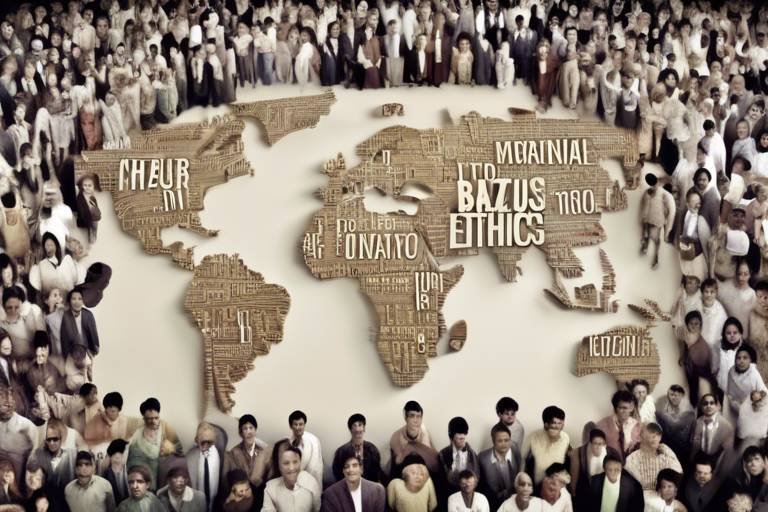The Role of Ethics in Globalization
In today's rapidly changing world, the phenomenon of globalization is not just a buzzword; it is a reality that shapes our lives in profound ways. As nations become increasingly interconnected through trade, technology, and cultural exchange, the role of ethics in this landscape is more crucial than ever. But what does it mean to be ethical in a globalized context? How do we navigate the complex web of relationships that span continents and cultures? These questions are at the heart of discussions about globalization and its implications for our shared future.
Globalization brings with it a host of benefits, such as increased economic opportunities, cultural exchange, and the sharing of ideas. However, it also presents significant challenges, including disparities in wealth, environmental degradation, and the erosion of local cultures. As we traverse this intricate landscape, ethical considerations become essential in guiding our actions and decisions. It’s not just about making profits; it’s about ensuring that our business practices and international relations are grounded in principles that promote fairness, justice, and respect for all individuals, regardless of their background.
In essence, the role of ethics in globalization can be understood through various lenses. For instance, companies operating on a global scale must grapple with ethical dilemmas that arise from differing cultural norms and regulatory environments. Should they prioritize profit over people? How do they ensure that their supply chains are free from exploitation? These are not merely academic questions; they are real challenges faced by businesses every day. The answers often lie in adopting a robust ethical framework that considers the impacts of their actions on a global scale.
Moreover, as we engage with diverse cultures, we must also be aware of our responsibilities in fostering cultural sensitivity. The exchange of ideas and traditions can enrich our lives, but it can also lead to exploitation and appropriation if not approached with care. Understanding the nuances of different cultural values is essential for ethical interactions, allowing us to appreciate and respect the rich tapestry of human experience without falling into the trap of cultural insensitivity.
As we look to the future, the importance of ethics in globalization will only grow. With the rise of technology and social movements advocating for change, there is an urgent need for continuous ethical reflection. We must ask ourselves: how can we ensure that globalization serves the common good? What frameworks can we put in place to promote ethical behavior in an increasingly interconnected world? The answers to these questions will shape the trajectory of globalization and our collective future.
In conclusion, the intersection of ethics and globalization is a complex yet vital area of exploration. As we navigate the challenges and opportunities presented by this global landscape, let us commit to fostering ethical practices that uplift individuals and communities around the world. The choices we make today will resonate for generations to come, and it is our responsibility to ensure that they reflect our highest values.
- What is globalization? Globalization refers to the process by which businesses, cultures, and economies become interconnected on a global scale.
- Why is ethics important in globalization? Ethics helps guide decisions and actions in a way that promotes fairness, justice, and respect across diverse cultures and economies.
- What are some ethical frameworks used in globalization? Common ethical frameworks include consequentialism, deontology, and virtue ethics, each offering different perspectives on moral decision-making.
- How can businesses implement ethical practices? Businesses can adopt Corporate Social Responsibility (CSR) initiatives, ensure fair labor practices, and engage in sustainable sourcing to promote ethical conduct.
- What are the challenges of ethical globalization? Challenges include cultural differences, varying regulatory environments, and resource constraints that may hinder the implementation of ethical practices.

[Understanding Globalization]
Globalization is more than just a buzzword; it's a complex tapestry woven from the threads of economics, culture, and politics that define our modern world. In simple terms, it refers to the process by which businesses, cultures, and governments become interconnected and interdependent on a global scale. Imagine a vast web where each strand represents a different country or culture, all pulling together to create a unified, albeit intricate, system. This interconnectedness brings with it a host of benefits and challenges.
On the one hand, globalization has opened doors to new markets, allowing businesses to expand far beyond their local borders. This expansion often leads to increased economic growth and innovation. For instance, a tech startup in Silicon Valley can now reach customers in Asia, Europe, and Africa with just a few clicks. This ease of access not only boosts profits but also fosters a spirit of collaboration and knowledge-sharing that can propel industries forward.
However, it’s not all sunshine and rainbows. Globalization also presents significant challenges. As economies become intertwined, the risk of economic volatility increases. A financial crisis in one part of the world can send shockwaves across the globe, affecting countless lives. Moreover, the cultural exchange that comes with globalization can sometimes lead to a loss of local identities and traditions. It’s like a beautiful potluck dinner where everyone brings their own dish, but if one dish dominates the table, the others might get pushed aside.
To understand globalization fully, we must also recognize its impact on social structures. The flow of information, goods, and services can lead to a greater awareness of global issues such as poverty, climate change, and human rights abuses. This awareness often sparks movements advocating for change, pushing societies to address these pressing challenges. Yet, the question remains: are we prepared to handle the complexities that arise from this interconnected web?
In sum, globalization is a double-edged sword. Its ability to connect people and ideas can lead to remarkable advancements, but it also poses risks that can undermine local cultures and economies. As we navigate this intricate landscape, it becomes increasingly important to consider the ethical implications of our actions on a global scale. After all, in this vast interconnected world, what happens in one corner can reverberate throughout the entire globe.

[Ethical Frameworks in Global Context]
In today's interconnected world, the importance of ethics cannot be overstated. As globalization weaves its intricate tapestry across nations, the ethical frameworks that guide decision-making become crucial in navigating complex international landscapes. Consequentialism, deontology, and virtue ethics are three primary ethical theories that offer diverse perspectives on how to approach global issues. Each framework provides a unique lens through which individuals and organizations can evaluate their actions and the resulting impacts on society.
Consequentialism focuses on the outcomes of actions. In a global context, this means evaluating policies and business practices based on their consequences for all stakeholders involved. For instance, when a corporation decides to outsource production to a country with cheaper labor, a consequentialist approach would assess the impact on local workers, the environment, and the overall economy. If the benefits to shareholders outweigh the negative consequences, such an action might be deemed acceptable. However, this can lead to ethical dilemmas, especially when the welfare of marginalized communities is at stake.
On the other hand, deontology emphasizes the importance of following moral rules and duties, regardless of the outcomes. This perspective is particularly relevant in international relations, where treaties and agreements often hinge on adherence to ethical commitments. For example, a country may prioritize human rights in its foreign policy, even if doing so could strain economic relationships with nations that have poor human rights records. Deontological ethics remind us that some principles, such as justice and fairness, should not be sacrificed for the sake of profit or expediency.
Virtue ethics shifts the focus from rules and consequences to the character of the individual or organization making decisions. It encourages a holistic view of ethics, emphasizing the development of good character traits such as honesty, integrity, and compassion. In a globalized world, fostering virtuous behavior can lead to more ethical interactions between cultures and nations. For instance, businesses that prioritize ethical leadership and corporate culture may find themselves better equipped to navigate the complexities of international markets, fostering trust and collaboration.
To further illustrate the application of these ethical frameworks in a global context, consider the following table that summarizes their key features:
| Ethical Framework | Focus | Application |
|---|---|---|
| Consequentialism | Outcomes of actions | Evaluating policies based on their impacts on stakeholders |
| Deontology | Moral rules and duties | Adhering to ethical commitments in international agreements |
| Virtue Ethics | Character of decision-makers | Promoting ethical leadership and corporate culture |
As globalization continues to evolve, the interplay between these ethical frameworks will shape the way individuals and organizations approach international challenges. Whether it’s addressing climate change, navigating trade agreements, or ensuring fair labor practices, understanding these frameworks can empower decision-makers to act responsibly and ethically. Ultimately, as we engage in this global dialogue, we must ask ourselves: how can we align our actions with our values to foster a more just and equitable world?
- What is the significance of ethics in globalization? Ethics play a crucial role in guiding international relations, business practices, and cultural exchanges, ensuring that actions taken in a global context are just and equitable.
- How do ethical frameworks influence corporate decisions? Ethical frameworks help corporations evaluate their actions based on outcomes, duties, and character, leading to more responsible business practices.
- What are some challenges in applying ethical frameworks globally? Cultural differences, varying legal standards, and economic pressures can complicate the application of ethical frameworks across different contexts.

[Corporate Social Responsibility (CSR)]
Corporate Social Responsibility, or CSR, has emerged as a cornerstone of modern business practices, reflecting a company's commitment to ethical behavior and social accountability. In an era where consumers are increasingly aware of the impact their purchases have on the world, businesses are recognizing that their responsibilities extend beyond mere profit-making. Instead, they are expected to consider the broader implications of their operations on society and the environment.
At its core, CSR encompasses a wide range of initiatives aimed at promoting sustainability and social justice. Companies are now integrating ethical considerations into their business models, which not only enhances their brand reputation but also fosters loyalty among consumers who prioritize ethical consumption. Think of CSR as a social contract between businesses and the communities they serve; it’s about building trust and ensuring that the benefits of business activities are shared fairly.
Many organizations are taking proactive steps to incorporate CSR into their operations. This often includes:
- Implementing sustainable practices, such as reducing carbon footprints and minimizing waste.
- Engaging in fair labor practices and ensuring that workers are treated with respect and dignity.
- Supporting community initiatives through charitable donations and volunteer programs.
- Promoting diversity and inclusion within the workplace.
These efforts not only contribute to a better world but also enhance a company's overall performance. Studies have shown that businesses with robust CSR programs often experience improved employee morale, customer loyalty, and even financial performance. It's a win-win situation where doing good leads to doing well.
However, the journey towards effective CSR is not without its challenges. Companies may face obstacles such as a lack of resources, cultural differences, and varying regulatory environments that can complicate their efforts. For instance, a multinational corporation operating in diverse markets must navigate different cultural expectations and legal frameworks, making it essential for them to tailor their CSR strategies accordingly.
In conclusion, CSR is more than just a buzzword; it represents a fundamental shift in how businesses operate in a globalized world. By embracing ethical practices and prioritizing social responsibility, companies can not only contribute to a better society but also secure their own long-term success. As we move forward, it will be fascinating to see how CSR evolves and adapts to the ever-changing landscape of global business.
- What is Corporate Social Responsibility (CSR)?
CSR is a business model in which companies integrate social and environmental concerns into their operations and interactions with stakeholders. - Why is CSR important?
CSR is important because it helps businesses build trust with consumers, improve their brand image, and contribute positively to society and the environment. - How can companies implement CSR effectively?
Companies can implement CSR by setting clear goals, engaging with stakeholders, measuring impact, and being transparent about their practices.

[Case Studies of CSR Successes]
When we talk about Corporate Social Responsibility (CSR), it’s not just a buzzword; it’s a vital part of how businesses operate in today’s world. Companies that embrace CSR not only enhance their brand reputation but also contribute positively to society and the environment. Let’s dive into some inspiring case studies that showcase how organizations have successfully integrated ethical practices into their operations.
One standout example is Unilever, a multinational consumer goods company. Unilever launched the Sustainable Living Plan, which aims to reduce its environmental footprint while increasing its positive social impact. By 2020, Unilever had achieved significant milestones, such as sourcing 100% of its palm oil sustainably and reducing greenhouse gas emissions from its manufacturing processes by over 60%. This commitment not only bolstered its brand image but also attracted consumers who prioritize sustainability.
Another compelling case is that of Patagonia, an outdoor apparel company renowned for its ethical stance. Patagonia’s “1% for the Planet” initiative pledges 1% of sales to environmental organizations worldwide. This commitment has fostered a strong community of environmentally conscious consumers and has significantly contributed to various conservation efforts. Moreover, their transparency about labor practices and environmental impact has set a benchmark for other companies in the industry.
In the tech sector, Salesforce stands out with its integrated CSR strategy. The company operates on a model called the Ohana Culture, which emphasizes family, community, and shared success. Salesforce dedicates 1% of its product, equity, and employee time to philanthropic causes. This initiative not only enhances employee morale but also creates a positive social impact by addressing issues like education and equality. Their efforts have resulted in millions of dollars donated to various causes, showcasing how tech companies can lead in social responsibility.
These case studies illustrate that successful CSR initiatives are often rooted in genuine commitment rather than mere marketing tactics. By adopting ethical practices, these companies have not only improved their bottom lines but have also made a lasting impact on communities and the environment. As we look at these examples, it’s clear that when businesses prioritize ethics, they can drive change and inspire others to follow suit.
In summary, the successes of Unilever, Patagonia, and Salesforce highlight the transformative power of CSR. They remind us that ethical business practices are not just good for the world; they are good for business. As more companies recognize the importance of integrating CSR into their core strategies, we can expect to see a more sustainable and equitable global marketplace.
- What is Corporate Social Responsibility (CSR)?
CSR refers to a business model in which companies incorporate social and environmental concerns into their operations and interactions with stakeholders. - Why is CSR important for businesses?
CSR helps businesses build trust with consumers, enhance brand loyalty, and foster a positive public image, all of which can lead to increased profitability. - Can CSR initiatives impact a company’s financial performance?
Yes, studies have shown that companies with strong CSR programs often experience better financial performance, as they attract a loyal customer base and can reduce costs through sustainable practices. - How can small businesses implement CSR?
Small businesses can start by identifying local issues they care about, engaging in community service, or adopting sustainable practices that align with their values.

[Challenges in Implementing CSR]
Implementing Corporate Social Responsibility (CSR) can often feel like navigating a maze filled with obstacles. Companies, regardless of their size or industry, face a myriad of challenges that can impede their ability to integrate ethical practices into their operations. One of the most significant hurdles is the lack of resources. Many organizations, particularly small and medium-sized enterprises (SMEs), struggle to allocate sufficient funds or manpower to develop and execute CSR initiatives. Without a dedicated budget, it can be tough to prioritize sustainability or social justice efforts when immediate profit margins are at stake.
Moreover, cultural differences can complicate matters. What is considered an ethical practice in one country might not hold the same weight in another. For instance, labor standards vary widely across the globe, and companies operating in multiple regions must navigate these disparities carefully. A practice deemed acceptable in one culture may be viewed as exploitative in another, creating a complex web of ethical considerations that must be addressed. This cultural dissonance can lead to misunderstandings and miscommunications, ultimately hindering CSR efforts.
Additionally, the varying regulatory environments present another layer of difficulty. Different countries have distinct laws and regulations regarding environmental protection, labor rights, and corporate governance. Companies must not only comply with their home country's regulations but also adapt to the legal frameworks of every market they enter. This can be particularly challenging for multinational corporations that operate in jurisdictions with conflicting standards. The risk of non-compliance can lead to significant legal repercussions and damage to the company's reputation.
To illustrate these challenges, consider the following table that summarizes key obstacles companies face in implementing CSR:
| Challenge | Description |
|---|---|
| Lack of Resources | Insufficient funds or manpower to develop and implement CSR initiatives. |
| Cultural Differences | Disparities in ethical practices and labor standards across different regions. |
| Regulatory Environments | Complexity of complying with various laws and regulations in different countries. |
Lastly, it's essential to recognize that the commitment to CSR must come from the top down. Leadership plays a pivotal role in fostering an organizational culture that values ethical practices. If executives and managers do not prioritize CSR, it can create a trickle-down effect, leading to a lack of enthusiasm or engagement among employees. This disengagement can further exacerbate the challenges faced in implementing CSR initiatives. Therefore, for CSR to thrive, it requires a concerted effort from all levels of the organization, coupled with a genuine commitment to making a positive impact.
- What is CSR? Corporate Social Responsibility refers to the efforts made by companies to improve society and the environment while conducting their business.
- Why is CSR important? CSR is important because it helps businesses operate sustainably, enhances their reputation, and builds trust with consumers.
- What are some common challenges in CSR? Common challenges include lack of resources, cultural differences, and navigating varying regulatory environments.

[Ethics in International Trade]
International trade is a complex web of interactions that not only facilitates the exchange of goods and services but also raises a myriad of ethical concerns. As businesses expand their reach across borders, they encounter a landscape where ethical standards can vary significantly. This divergence leads to critical questions: How do we ensure fair labor practices? What measures are in place to protect the environment? And, importantly, how do we balance profit with responsibility?
One of the most pressing ethical issues in international trade revolves around labor practices. In many developing countries, the labor laws may not be as stringent as those in developed nations, leading to exploitation of workers. For instance, child labor, unsafe working conditions, and unfair wages are rampant in some industries. Companies must grapple with the dilemma of sourcing cheaper labor while ensuring that their supply chains adhere to ethical practices. This is where the concept of ethical sourcing comes into play, pushing businesses to prioritize suppliers who respect labor rights and provide safe working environments.
Furthermore, the environmental impact of international trade cannot be overlooked. The production and transportation of goods across the globe contribute significantly to pollution and climate change. Companies are increasingly held accountable for their environmental footprint, prompting a shift towards more sustainable practices. Initiatives such as fair trade aim not only to promote equitable economic relationships but also to ensure that environmental standards are met. By choosing to engage in fair trade, businesses support sustainable farming practices and help protect the planet.
To illustrate the significance of ethics in international trade, let’s take a look at a few key principles that guide ethical practices:
- Transparency: Businesses should be open about their sourcing practices and supply chains.
- Accountability: Companies must take responsibility for their impact on workers and the environment.
- Fairness: Ensuring that all parties involved in trade benefit equitably from the transactions.
In addition to these principles, the role of corporate social responsibility (CSR) is paramount. Companies that embrace CSR not only enhance their brand reputation but also contribute positively to the communities they engage with. By implementing ethical trade practices, organizations can build trust with consumers who are increasingly concerned about the origins of the products they purchase.
However, the path to ethical international trade is fraught with challenges. Businesses often face pressure to reduce costs, which can lead to compromising on ethical standards. Moreover, navigating the complex regulatory environments of different countries can make it difficult to maintain consistent ethical practices. Companies must be vigilant and proactive in their approach to ethics, continuously evaluating their practices and seeking ways to improve.
In conclusion, ethics in international trade is not just an afterthought; it is a fundamental aspect of doing business in today’s globalized world. As consumers become more aware and demand accountability, companies that prioritize ethical practices will not only thrive but also contribute to a more equitable and sustainable global economy. The responsibility lies with each of us—businesses, consumers, and governments—to champion ethical trade and ensure that the benefits of globalization are shared by all.
- What is ethical sourcing? Ethical sourcing refers to the process of ensuring that the products being sourced are obtained in a responsible and sustainable manner, considering the rights of workers and the environment.
- Why is fair trade important? Fair trade is important because it promotes equitable trading conditions, supports sustainable farming practices, and helps to improve the livelihoods of marginalized producers.
- How can consumers support ethical trade? Consumers can support ethical trade by choosing to purchase products from companies that prioritize ethical sourcing and CSR initiatives.

[Cultural Sensitivity and Ethics]
Cultural sensitivity is not just a buzzword; it’s a vital component in the tapestry of globalization. As our world becomes increasingly interconnected, the importance of understanding and respecting diverse cultural values cannot be overstated. Imagine trying to navigate a foreign country without knowing the local customs—it's like walking into a room full of people speaking a different language. You might get the words right, but the meaning could be lost in translation. This is where cultural sensitivity steps in, acting as a bridge that fosters ethical interactions across borders.
In a globalized society, ethical dilemmas often arise from cultural misunderstandings. For instance, what may be considered polite in one culture could be deemed offensive in another. This disparity highlights the necessity of cultivating an awareness of different cultural norms. It’s essential for businesses, governments, and individuals to engage in active listening and open dialogue, ensuring that their actions are respectful and considerate. By doing so, they can avoid the pitfalls of cultural appropriation, where elements of one culture are taken out of context and exploited without understanding their significance.
Moreover, cultural sensitivity plays a crucial role in enhancing international relations. When countries engage with one another, acknowledging and respecting cultural differences can pave the way for stronger partnerships. This can lead to collaborative efforts in various fields, such as trade, education, and environmental sustainability. For example, when multinational corporations enter new markets, they must adapt their business practices to align with local customs and values. Failure to do so can result in backlash, damaging both reputation and profitability.
To illustrate the importance of cultural sensitivity, consider the following key aspects:
- Awareness: Being aware of cultural differences is the first step toward fostering respectful interactions.
- Adaptability: The ability to adapt one’s behavior and communication style according to cultural contexts is crucial.
- Empathy: Understanding the feelings and perspectives of others can enhance relationships and reduce conflicts.
When organizations prioritize cultural sensitivity, they not only enhance their ethical standing but also contribute to a more harmonious global community. This is particularly evident in industries like tourism and hospitality, where cultural exchanges are frequent. By promoting authentic cultural appreciation rather than mere exploitation, businesses can create enriching experiences for both visitors and locals alike.
As globalization continues to evolve, the ethical implications of cultural exchange will remain a critical area of focus. It’s essential for individuals and organizations to engage in ongoing education about the cultures they interact with, ensuring that their actions reflect a commitment to ethical practices. After all, in a world where our actions can have far-reaching consequences, embracing cultural sensitivity is not just a moral obligation; it's a pathway to a more equitable and respectful global society.
- What is cultural sensitivity? Cultural sensitivity refers to the awareness and understanding of cultural differences, which allows for respectful interactions among diverse groups.
- Why is cultural sensitivity important in globalization? It helps prevent misunderstandings, fosters better relationships, and enhances ethical practices in international interactions.
- How can individuals promote cultural sensitivity? By educating themselves about different cultures, practicing empathy, and adapting their behaviors in cross-cultural situations.

[Ethical Implications of Cultural Exchange]
The phenomenon of cultural exchange is like a double-edged sword; it offers opportunities for enrichment and understanding, yet it can also lead to exploitation and misunderstanding. As we navigate through this interconnected world, it’s crucial to recognize the ethical implications that come with sharing and adopting cultural practices. When we think about cultural exchange, we often envision vibrant festivals, art, music, and culinary experiences that cross borders. However, beneath this surface lies a complex web of ethical considerations that demand attention.
At its core, cultural exchange should be about mutual respect and appreciation. But what happens when one culture appropriates elements from another without understanding or respecting its origins? This is where the ethical dilemma arises. Cultural appropriation can be seen as a form of exploitation, where dominant cultures take from marginalized ones without giving due credit or compensation. For instance, consider the use of traditional indigenous designs in fashion without acknowledgment of their significance. Such actions can perpetuate stereotypes and undermine the original culture’s value.
To foster genuine cultural exchange, it’s essential to prioritize authenticity and respect. This means engaging with cultures in a way that honors their traditions and values. Organizations and individuals must ask themselves: Are we simply borrowing elements for our gain, or are we genuinely appreciating and supporting the culture we are engaging with? This question is pivotal in ensuring ethical interactions.
Moreover, the rise of social media has amplified both the opportunities and challenges of cultural exchange. On one hand, platforms like Instagram and TikTok allow for the rapid sharing of cultural expressions, creating a global stage for artists and traditions that might otherwise remain localized. On the other hand, this widespread exposure can lead to misrepresentation and commodification of cultures. For example, when a traditional dance is performed without context or understanding, it risks becoming a mere spectacle rather than a form of cultural expression.
As we look to the future, it’s vital to establish frameworks that promote ethical cultural exchange. This can include:
- Education: Encouraging learning about different cultures to foster understanding and respect.
- Collaboration: Working with cultural representatives to ensure authenticity and respect in representation.
- Compensation: Acknowledging and compensating cultures for their contributions, especially in creative industries.
In conclusion, the ethical implications of cultural exchange are profound and multifaceted. It requires us to reflect on our actions, recognize the power dynamics at play, and strive for a more equitable and respectful engagement with cultures different from our own. By doing so, we can transform cultural exchange from a potential source of conflict into a pathway for understanding and unity.
Q1: What is cultural appropriation?
A1: Cultural appropriation refers to the adoption of elements from one culture by members of another culture, often without permission or understanding, leading to misunderstandings and exploitation.
Q2: How can we ensure ethical cultural exchange?
A2: We can ensure ethical cultural exchange by engaging with cultures respectfully, educating ourselves about their significance, collaborating with cultural representatives, and compensating them for their contributions.
Q3: Why is cultural sensitivity important?
A3: Cultural sensitivity is crucial as it fosters respect and understanding, helping to avoid misunderstandings and conflicts that can arise from cultural exchanges.

[Future Trends in Ethical Globalization]
As we gaze into the horizon of globalization, we can't help but notice that the landscape is constantly shifting. With the rapid evolution of technology, the rise of social movements, and the growing influence of global governance, the ethical dimensions of globalization are becoming more pronounced. It's like watching a thrilling movie where the plot twists keep coming, and each scene reveals new layers of complexity. So, what does the future hold for ethical globalization?
One of the most significant trends is the integration of technology into ethical practices. Think about it: with the advent of artificial intelligence, blockchain, and big data, businesses now have tools at their disposal that can enhance transparency and accountability. For instance, blockchain technology can be used to ensure fair trade practices by providing an immutable record of transactions. This not only promotes ethical sourcing but also builds trust among consumers who are increasingly concerned about where their products come from.
Moreover, social movements are gaining momentum, advocating for ethical practices in all sectors. From environmental sustainability to labor rights, these movements are not just a passing trend; they are reshaping the corporate landscape. Companies are now more than ever aware that consumers are paying attention. The rise of conscious consumerism means that businesses must align their operations with ethical standards or risk losing their customer base. It's a powerful reminder that the voice of the people can drive change.
In addition to technology and social movements, global governance is becoming a key player in promoting ethical globalization. International organizations and agreements are stepping up to establish guidelines that encourage ethical practices across borders. For example, the United Nations Sustainable Development Goals (SDGs) provide a framework for countries and corporations to work towards a more equitable and sustainable future. This collaborative approach emphasizes that ethical globalization is not just an individual effort but a collective responsibility.
However, with these trends come challenges that cannot be ignored. As we navigate this complex terrain, it is essential to foster a culture of continuous ethical reflection. Organizations must be willing to adapt and evolve their practices to meet the changing expectations of a global audience. This means not only addressing current ethical dilemmas but also anticipating future issues that may arise as globalization continues to evolve.
In conclusion, the future of ethical globalization is a dynamic interplay of technology, social movements, and global governance. As we move forward, it is crucial to remain vigilant and committed to ethical practices that promote sustainability, equity, and respect for cultural diversity. The journey may be fraught with challenges, but the potential for positive change is immense. Are we ready to embrace this future?
- What is ethical globalization? Ethical globalization refers to the practice of conducting international relations, business, and cultural exchanges in a manner that respects human rights, environmental sustainability, and cultural diversity.
- How can technology contribute to ethical globalization? Technology can enhance transparency and accountability in business practices, promote fair trade, and facilitate communication across cultures, thereby supporting ethical standards.
- What role do social movements play in ethical globalization? Social movements advocate for ethical practices and hold corporations accountable, influencing consumer behavior and pushing for changes in policies and practices.
- Why is global governance important for ethical globalization? Global governance establishes frameworks and guidelines that encourage ethical practices across borders, fostering collaboration among countries and organizations.
Frequently Asked Questions
- What is globalization?
Globalization is the process of increasing interconnectedness among countries through trade, communication, and cultural exchange. It encompasses economic, political, and social dimensions, impacting how nations interact and cooperate.
- How do ethics influence globalization?
Ethics play a crucial role in globalization by guiding the behavior of individuals and organizations in international contexts. Ethical considerations shape policies, business practices, and cultural exchanges, ensuring that actions are not only beneficial but also just and fair.
- What are some ethical frameworks relevant to globalization?
Key ethical frameworks include consequentialism, which focuses on the outcomes of actions; deontology, which emphasizes duties and rules; and virtue ethics, which considers the character of individuals. Each framework offers different perspectives on addressing global challenges.
- What is Corporate Social Responsibility (CSR)?
CSR refers to the efforts made by companies to integrate ethical practices into their business operations. This includes promoting sustainability, social justice, and community engagement, ultimately enhancing their reputation and fostering trust among stakeholders.
- Can you provide examples of successful CSR initiatives?
Absolutely! Companies like Patagonia and Ben & Jerry’s have implemented successful CSR initiatives, focusing on environmental sustainability and social justice. Their efforts not only benefit communities and the planet but also resonate with consumers, enhancing brand loyalty.
- What challenges do organizations face when implementing CSR?
Organizations often encounter obstacles such as limited resources, cultural differences, and varying regulatory environments. These challenges can hinder their ability to effectively adopt and maintain ethical practices on a global scale.
- What ethical issues arise in international trade?
International trade raises significant ethical concerns, particularly regarding labor practices, environmental standards, and fair trade. Ethical sourcing and fair trade initiatives aim to address these issues, promoting equitable relationships among trading partners.
- Why is cultural sensitivity important in globalization?
Cultural sensitivity is essential for navigating ethical dilemmas in a globalized world. Understanding diverse cultural values and practices fosters respectful interactions and helps prevent misunderstandings and conflicts.
- What are the ethical implications of cultural exchange?
Cultural exchange can enrich societies, but it also carries the risk of exploitation and cultural appropriation. It’s important for individuals and organizations to promote authentic cultural appreciation while respecting the origins and significance of cultural elements.
- What future trends are shaping ethical globalization?
Emerging trends include the rise of technology, increased social movements advocating for justice, and the evolution of global governance. These trends highlight the need for ongoing ethical reflection as we navigate a rapidly changing world.



















